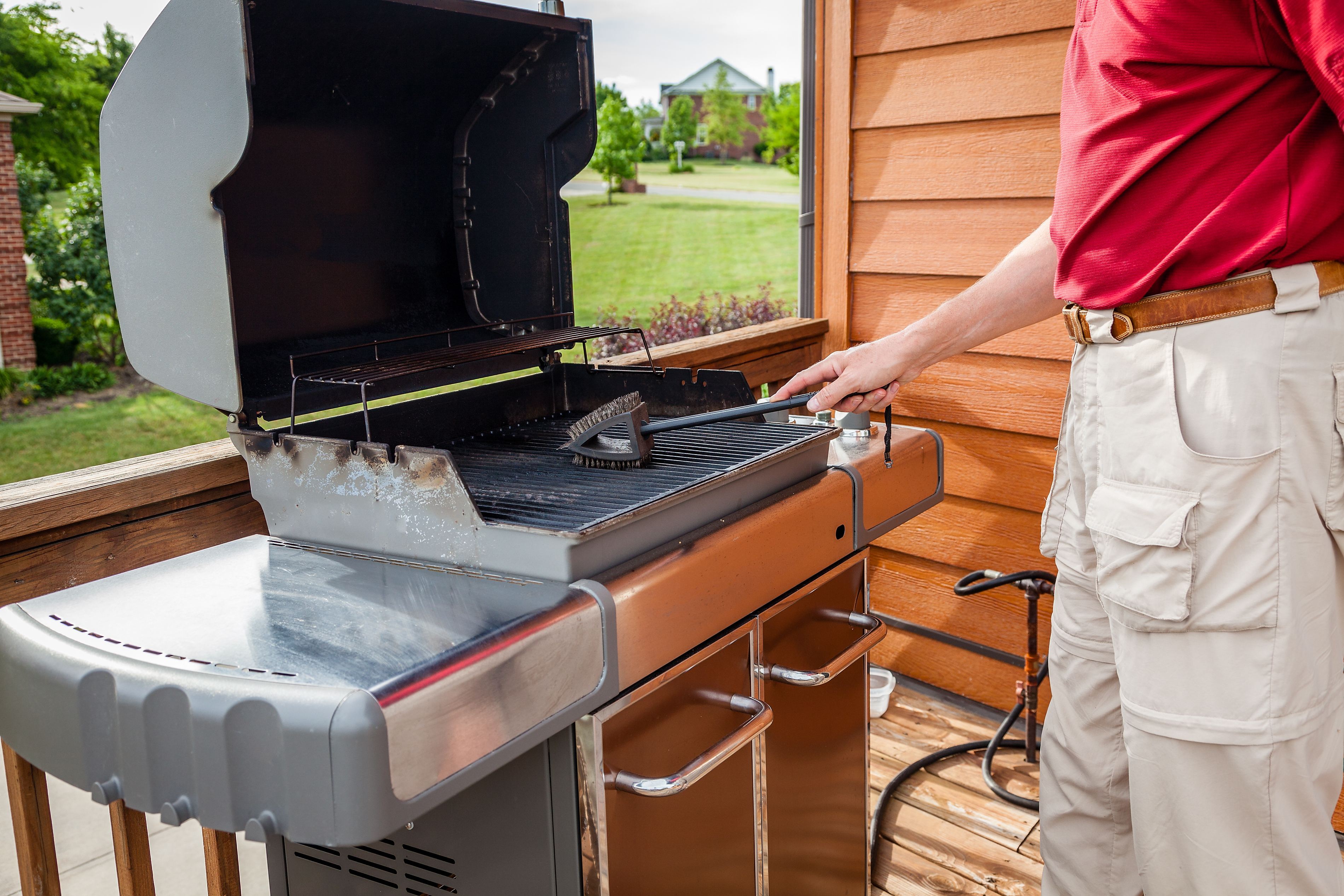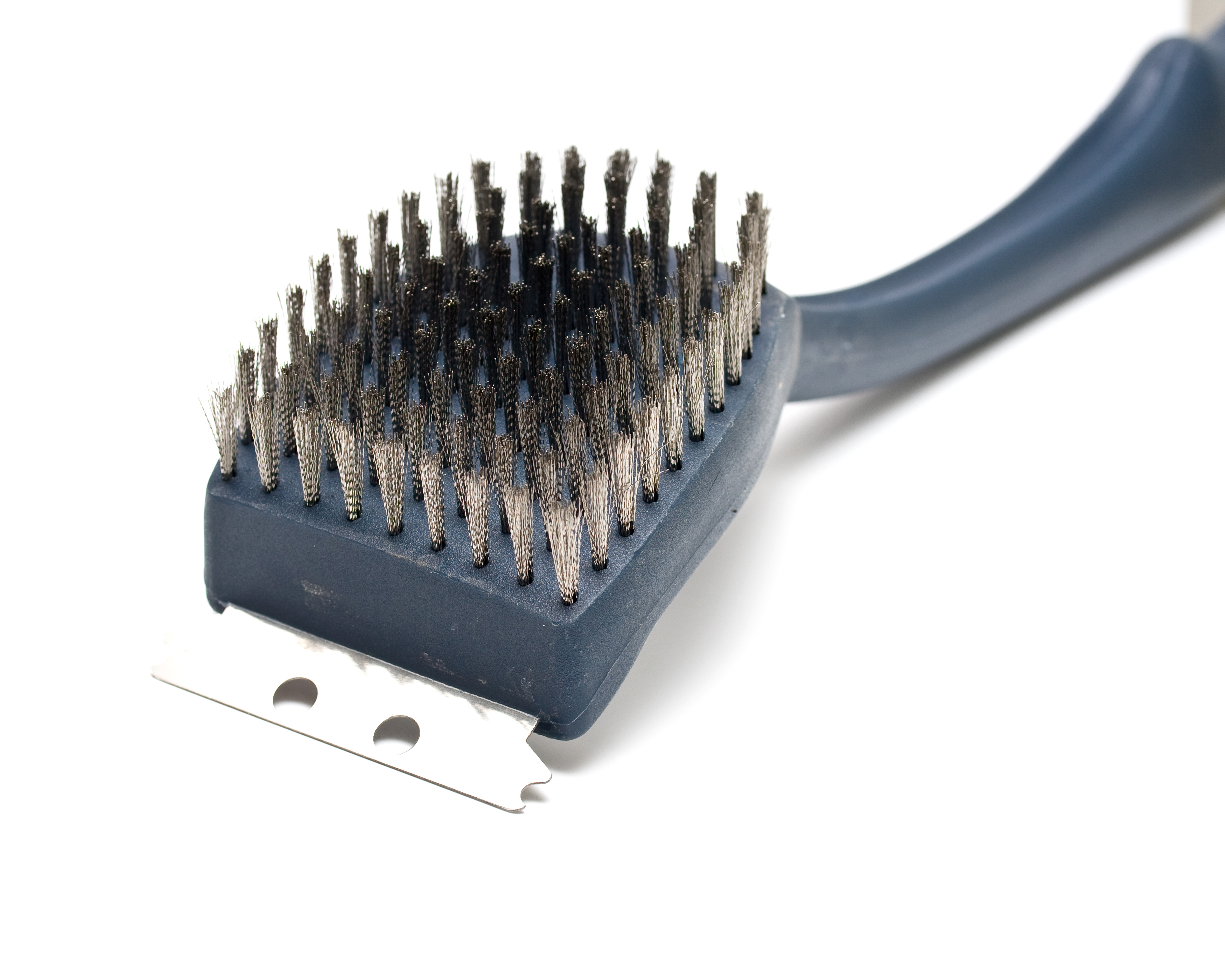Removing the baked-on crud from your grill’s cooking grate has long required something you can’t get in a bottle, can, or jar: elbow grease.
But even that may be changing.
Barbecue sauces, marinades, and seasonings add so much flavor to everything you cook on a grill. But they can also can burn, leaving a hardened residue on your grill grate that can affect the performance of your grill adversely—and may create off-flavors of food upon subsequent grilling.
So to keep your grill at peak performance and to get the best taste experience, cleaning the grill grate frequently of the carbonized debris is essential grill maintenance.
NOTE: For a top-to-bottom guide to charcoal and gas grill maintenance, check out these tutorials from our good friend, Kevin Kolman at Weber Grills.
The essential tool for cleaning your grill is a grill brush, preferably one that combines several cleaning gadgets into a single tool.

What to Look For
For Charcoal Grills
While you can buy individual tools for scraping and scrubbing, a good, all-in-one grill brush for a charcoal grill with a stainless steel cooking grid should have:
- Solid construction – Generally a one-piece head and handle is best.
- A long handle to keep your hands and clothing away from the heat.
- Stainless steel bristles – These are sturdier and more long-lasting than brass bristles. Brass bristles may be best for porcelain-coated grates because they are softer and gentler on the porcelain. However, they may need to be replaced more frequently than a brush with stainless steel bristles. Make sure the bristles are well-seated so they won’t fall out and get stuck to the grill. Many injuries are reported each year because an unnoticed bristle got lodged in a piece of food.
- A scraper – A straight edge 2-4 inches wide. A scraper should not be used on porcelain-coated grids as it may scratch or chip the porcelain.
- A notched scraper is often cut into the straight-edge blade to make it ideal for cleaning individual stainless-steel grates on a charcoal grill.
- Some brushes combine a third tool: a scrubbing pad that is ideal for cleaning porcelain grates.

For Gas Grills
With porcelain-coated grates a soft brass-bristled brush or nylon-bristled brush is best and is unlikely to chip or scratch the surface.
For cast-iron, brass or nylon are best bets, as well. Be sure to oil the grates after cleaning to prevent rust.
Grill Cleaning Innovations
A couple of products are now on the market that offer new approaches to keeping your grill grate in tip-top shape.
- The Great Scrape is an innovative grill cleaner that is made of solid hardwood, has no brush, and is designed for use with stainless-steel, porcelain-coated, and cast-iron grates. It looks like a short paddle that acquires grooves as it is used on a hot grill grid. As the tool is used, the grooves are burned into the edge of the wood in a pattern that is exact to your particular grill grid.
- Think of the Grillbot Automatic Grill Cleaning Robot as a Roomba for your grill, but far less expensive. With push-button ease, Grillbot automatically cleans your grill grate with your choice of brass or stainless-steel brushes for cleaning cycles of 3 different durations.
How to Clean
Baked-on residue can compromise the heat transfer between grill grate and the food being cooked, and interfere with searing and making great grill marks.
Cleaning the grill grates every time you use the grill will help stave off the carbonized build-up.
For Charcoal Grills
Heat the grill grid over a hot fire to burn off any leftover food or sauce residue. Then, let the grid cool completely before using the brush and scraper.
For Gas Grills
Simply preheat the grill on high for 15 minutes with the lid closed and then brush the grates clean.
In a pinch, when nothing else is available, a crumpled ball of aluminum foil can serve as a stand-in brush.
How do you clean your grill grid? Do you have one or multiple tools for the task?



Leave Your Response